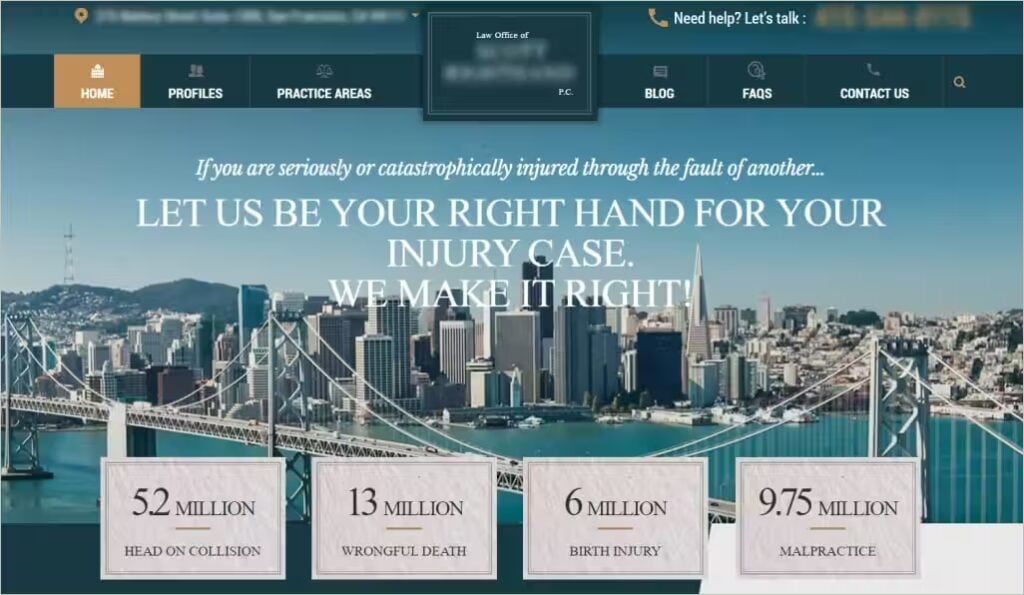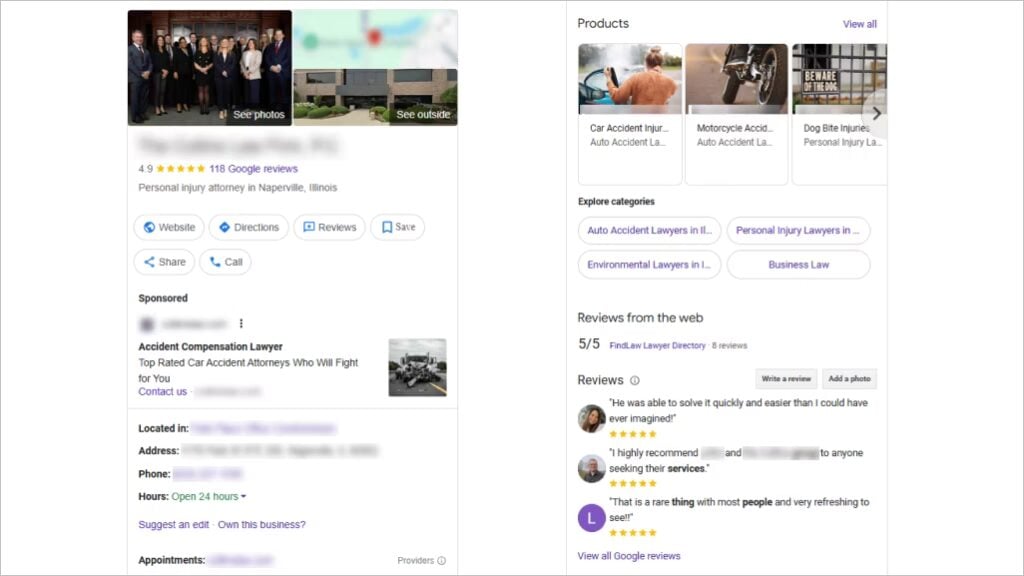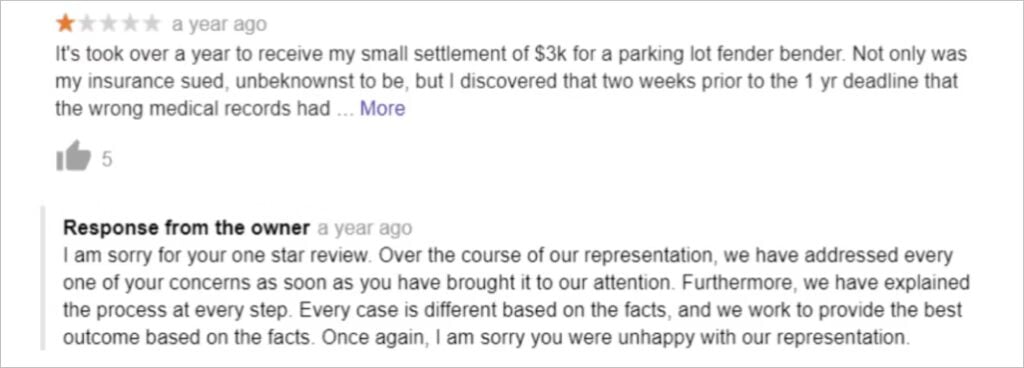How to get clients as a lawyer?
It’s a question every type of lawyer asks themselves — from newly branded attorneys to established firms.
Most law firms miss out on $100,000+ in revenue every year, not because they’re bad at the law, but because they’re invisible online.
Did you know that over 96% of people now look for legal help online?
So if you’re wondering how to get clients as a lawyer… first ask, does your law firm show up front and center to capture those leads?
Just look at SimVisa, an immigration law firm in Chicago. They had a 99% success rate with their service quality, but still struggled to get high-quality leads.
After we launched a full-scale marketing campaign — including SEO, PPC, content strategy, and a new website — SimVisa achieved a 1,100% increase in qualified leads!
So let’s break it down. This guide gives you the 10 most effective (and most overlooked) steps to grow your caseload in 2025.

Wondering How to Get Clients? These Might Be Your Current Sources
Most lawyers don’t have a marketing system, they have unreliable (and outdated) client sources:
- A sporadic referral here
- A one-off bar mixer there
- A stale listing on Avvo or Justia, they forgot to update 3 years ago
If this sounds familiar, you’re not alone!
With 1.3 million lawyers in the U.S., relying on old-school tactics won’t cut it anymore. It’s time for a reality check. Answer these 3 questions honestly — and let’s see if it’s time to upgrade your strategy.
1. How to Attract Clients to a Law Firm: Why Most Lawyers Get It Wrong
This is the #1 way lawyers get clients, and the #1 reason growth stalls.
Most lawyers depend on client referrals from past cases or trusted recommendations from their peers. And sure, word-of-mouth can work — it comes with credibility, low resistance, and warm leads. But here’s the thing:
- You don’t control it.
- You can’t scale it.
- And you definitely can’t predict it.
If your pipeline depends on someone else remembering your name over lunch, you’ve got a serious marketing problem!
Here’s a smarter move: Don’t wait for referrals. Build a digital marketing engine that works 24/7. With SEO, PPC, and high-converting web content, your firm can attract clients on your terms. Schedule your free consultation with us today.
2. How to Get Legal Clients Through Google (Instead of Just Hoping They Find You)
If you’re wondering how to get legal clients through Google, start with the basics — these small, practical steps can bring in your first clients from local search:
- Today, claim your Google My Business profile. Add your correct address, phone number, hours, and a professional photo.
- Update your website homepage to clearly state your practice area and city. Example: “Criminal Defense Attorney in Miami, FL.”
- Add a “Contact” page with a working phone number and a simple contact form.
- Ask for at least 3 client reviews — from past clients, colleagues, or referral partners.
- List your firm on multiple legal directories — not just one or two.
You might already be listed on sites like Avvo or Justia, but that’s not enough. Ask yourself:
- Is your profile complete and up to date?
- Do you have recent, positive reviews?
- Does your listing match the info on your website and Google?
If your profiles are half-finished or outdated, you’re losing trust — and potential clients.
These simple fixes can instantly improve your visibility and credibility online — and help you start getting real legal clients through Google and local search.
3. How to Bring In Clients to a Law Firm: It Takes More Than Just Showing Up at Events
Yes, legal networking and community involvement are important parts of how to bring in clients to a law firm.
But showing up once a year in a suit and handing out business cards like candy? That’s not it.
The attorneys who consistently land high-value cases stay active year-round:
- Joining professional associations
- Sponsoring local events
- Building real-world relationships
This works — because 92% of consumers trust referrals from people they know. That includes attorneys, doctors, and even PTA parents.
Here’s a smarter way to bring in clients to your law firm:
Be present where it matters. Join bar associations. Speak at events. Volunteer locally. When people see you show up consistently and with purpose, they don’t just recognize your name — they remember it when it counts.
10 Ways to Get Legal Clients Your Competitors Hope You Never Discover
How do you bring in clients for your law firm? These 10 proven strategies will help you build a law firm that attracts leads on autopilot (and make law school actually pay off)!
1. Map Out Your Ideal Client and Niche
If your message is for everyone, it won’t connect with anyone.
Did you know that legal professionals who focus on a specific niche grow 3.2 times faster than generalist firms?
When it comes to how to get legal clients, the fastest-growing lawyers start by defining their ideal client persona and choosing a clear legal niche. That’s how you shrink the competition and become the obvious go-to for your target audience.
Example:
“Business lawyer” blends in.
“Startup attorney for SaaS founders dealing with investor contracts” stands out.
Trying to market without a niche is like fishing with no bait — you might get lucky, but you’ll waste a lot of time on the water. A clear niche helps hook the right clients, faster.
The main takeaway: Get hyper-specific. That’s how to get legal clients who are actually a good fit — and come to you. Think about who you help best with your legal representation, and speak directly to their pain points.
2. Want to Know How to Get Legal Clients 24/7? Build a Website That Sells for You
If someone searches for your firm online, do they find a high-performing website that builds trust instantly, or a clunky homepage that sends them running?
Your law firm website is often the first — and sometimes the only — chance of making a good impression. If it’s slow to load, hard to navigate, not visually appealing, or missing key information, you lose potential clients before they even pick up the phone.
A great site doesn’t just look polished. It should:
- Load lightning-fast, especially on mobile — 53% of mobile users will abandon a website if it takes more than 3 seconds to load.
- Be optimized for search engines, ensuring you appear in relevant search results.
- Clearly communicate your services and value proposition.
- Guide visitors to take action, like contacting you or scheduling a consultation.

Need proof this works? Just look at Lehmbecker Law. Despite their stellar legal reputation, they weren’t attracting enough new clients online. We rebuilt their site from the ground up with better SEO, sharper messaging, and a smoother user experience.
Here’s what they saw next:
- 645% marketing ROI
- 1,425% increase in qualified leads
- 1,067% boost in organic traffic
So from now on, think of your website as your most reliable rainmaker, one that never takes a day off.
And if you need a little inspiration for your law firm’s website… Here are 60 of the top lawyer websites in 2025!
3. Want More Legal Clients? Start with the Free Power of Google Business
Did you know 42% hire the first lawyer they call?
If your Google Business Profile is incomplete or has outdated contact info, you’re missing out on one of the most powerful tools to get more clients.
Plus, a well-optimized profile helps you rank in Google’s “map pack,” giving potential clients instant access to your phone number, online reviews, and services!

This isn’t theoretical. Look at Hodgson Law Offices, a Spokane-based family law firm that came to us relying mostly on referrals and struggling with poor visibility online.
After redesigning their website with a strong SEO foundation and optimizing their Google Business Profile, they saw A 2,715% increase in organic traffic and a 440% increase in qualified leads… all in just 6 months!
To get the most out of your SEO, make sure your profile includes:
- A verified business name, phone, and location
- Your legal services listed clearly in the description
- Up-to-date hours and appointment info
- Regularly updated photos of your team or office
- A steady stream of client reviews — and your responses to them
But beware — you do NOT want to come off as a fake Google Business Profile. Tap the link to see what red flags to avoid.
4.Attract, Build Trust, and Grow: How to Find Legal Clients with Smart Content
When potential clients land on your site, they’re not just scanning for services — they’re sizing you up.
They want proof that you understand what they’re dealing with and know how to help.
Content marketing is a powerful way to demonstrate your expertise and build that trust. Moreover, law firms that blog consistently generate 67% more leads per month than those that don’t.
Here’s how to do it effectively:
- Legal Blogging:
Write blog posts that answer common questions your clients are already Googling. For example, an estate planning attorney can publish an article on “Do I Need a Will If I’m Under 40?”. - FAQs and Evergreen Guides:
Create content that explains complex legal processes in plain English. If you’re an immigration lawyer, for instance, you could add an FAQ page on acquiring green cards in the U.S. - Thought Leadership Posts:
Share your insights to position yourself as the expert. For example, if you’re an employment lawyer, you could write about new labor laws in your state. - Case Studies or Success Stories:
Show how you’ve helped real clients solve real problems. Be specific with case studies like, “How We Helped a Client Recover $300K After a Motorcycle Accident.”

Bottom line? If your content helps people before they hire you, they’re a lot more likely to hire you.
And if your legal copywriting still feels off, you’re probably missing these 4 effective content marketing tips that are crucial for lawyers in 2025.
5. Stay Top of Mind and Bring In Legal Clients with Smart Social and Email Outreach
You may be surprised to learn; 84% of law firms use social media marketing, and 41% use email marketing.
Why? Because when someone needs a lawyer, they’ll hire one who has already been showing up in their feed or inbox. Here’s how to use both social and email without burning out:
- LinkedIn:
Use it like a digital handshake. Share client-friendly insights, comment on relevant posts, and show up regularly. For example, if you’re a business attorney, post a short video on “5 Contract Red Flags for Startups”.
Want to build a LinkedIn profile that strengthens your legal practice? Follow these 15 steps!
- Email Marketing:
Send a simple monthly newsletter with legal tips, recent wins, or common questions. Think helpful, not salesy. An estate planning firm, for instance, could send an email on “3 End-of-Year Tax Tips”. - Client Communication Touchpoints:
Set up automated follow-ups after consultations and case closures to keep the relationship warm. Be human. Be helpful. A friendly check-in a few weeks later isn’t just good service — it’s a subtle reminder that you’re referral-worthy.
Want to stay 10 steps ahead of your fellow attorneys? Explore the top legal marketing trends for 2025 to attract leads to your own law firm!
6. Acquire Referrals In a Smart and Strategic Way
Did you know that 59% of legal clients find legal expertise through referrals from friends, family, or other professionals. This is a powerful way to get new clients!
But randomly asking for referrals won’t cut it. The lawyers who consistently get high-quality referrals build genuine, strategic professional connections. Try this approach:
Be Clear About Who You Serve
Saying “I do family law” is vague. But “I help working moms navigate custody and support without courtroom chaos” is specific and memorable.
The clearer you are, the easier it is for people to refer you. Convey this to social workers, CPAs, financial advisors, realtors, or whoever works with your ideal paying clients.
Offer Referrals First
Referrals are a two-way street. People are far more likely to send you clients if you’ve helped them first, or even made a warm intro. Be the connector.
For instance, if you’re a PI lawyer who sends a client to a trusted physical therapist, you might start referring accident cases in return.
Start by referring professionals like real estate agents, healthcare professionals, insurance brokers, or other lawyers to get referrals in return.
Follow Up and Stay in Touch
One handshake isn’t a relationship. Real connections need follow-up — a quick note, a shared article, a friendly check-in. It keeps you top of mind.
Stay in touch with your referral partners, past clients, and other attorneys who serve different practice areas because your best referral partnerships are intentionally built.
And with the right strategy, your network becomes one of your most powerful (and cost-effective) client pipelines. This is a great lead generation source, especially for new lawyers.
7. Turn Client Praise into Proof That Sells
In today’s digital-first world, clients find lawyers (and hire them) based on their online reputation. They trust what others say about you more than what you say about yourself.
The proof? 95% of consumers read online reviews before making a decision — and that includes hiring a lawyer!
So, how do you ace your legal reputation management?
- Request reviews at the right moment
The best time to ask is right after a win — when your satisfied clients are relieved, grateful, and likely to say yes. - Make it easy to leave a review
Send them a direct link. Offer a few guiding questions like “What did you appreciate most?” or “Would you recommend us to a friend?” - Use testimonials across your site
Don’t just collect them — showcase them. Place client praise on your homepage, service pages, and landing pages where trust matters most. - Respond to all reviews — the good, the bad, and the ugly
A thoughtful “thank you” builds goodwill and fosters loyal clients. If someone leaves a bad review, respond professionally and show potential clients that you care about getting it right.

People trust people. Turn your happiest clients into your loudest advocates!
But remember, your clients have options, and many law firms are competing for their attention.
Read our guide on how to Grow a Law Firm in 2025 to become their #1 option in a crowded market.
8. Use Paid Ads to Get Legal Clients Faster Than Ever
If you need leads now, not six months from now, it’s time to start running PPC campaigns.
The average conversion rate for legal search advertising is 7%, meaning that for every 100 clicks, approximately 7 potential clients take action.
Just ask Barr & Douds, a Northern California trust and estate litigation firm that found itself getting drowned out by competitors with larger ad budgets. Despite their strong reputation, their caseload was shrinking fast.
We revamped their website, SEO, and PPC strategy from the ground up. The result? A 937% increase in qualified leads and an 87% decrease in cost per lead!
With Google Ads, you can appear at the top of search results the moment someone types in “DUI lawyer near me” or “estate planning attorney in [city].”
Here’s how you can leverage it for client acquisition:
- Target local, high-value keywords relevant to your niche
Example: A personal injury firm could run Google Ads for “motorcycle accident lawyer Tampa”. - Write ad copy that speaks directly to client pain points
Think: “Injured? Get Legal Help Now. Free Consultations.” - Send people to dedicated landing pages — not your homepage
Your ad should lead to a page tailored to that search term with a clear call to action. - Track every click, call, and conversion
Use call tracking tools and Google Analytics to know exactly which ads are working.

P.S. PPC is your secret weapon… but then there are the costs! Set a budget that works in your favor using our guide on PPC for Law Firms.
9. Offer Payment Flexibility to Make It Easier for Clients to Say “Yes”
Hiring a lawyer can be intimidating, and not just emotionally. For many potential clients, the financial barrier is what stops them from moving forward. That’s why flexible payments aren’t just a nice-to-have — they’re your competitive edge.
Convenience wins clients who have urgent legal needs. 84% of consumers agree, admitting that they’re more likely to choose a provider who:
- Offers multiple payment options
Accept credit cards, ACH, and mobile payments through secure platforms. - Breaks down fees with clear payment plans
Let clients spread out the cost of legal services with structured installments. - Makes it clear and convenient
Add payment options to your website, emails, and intake forms so clients don’t have to ask.
Offering online billing and payment plans increases your accessibility. And when you make it easier to hire you, more people will.
10. Get Legal Clients by Speaking at Events and Hosting Seminars
Want to become the go-to name in your community? Don’t just market — educate.
Public speaking, community panels, and hosting legal seminars are powerful ways to build trust, authority, and name recognition.
People may not need a lawyer today. But when they do, they’ll remember the one who helped them understand their rights, avoid mistakes, or navigate a tough situation before the crisis hit.
Here’s how to use it strategically:
- Speak where your audience is
Host a “Know Your Rights” and similar community events at the local library.
Present at a local chamber of commerce meeting on “Top 3 Legal Mistakes Small Businesses Make.” - Partner with trusted local orgs
Team up with schools, nonprofits, or community groups to co-host workshops on legal basics.
For example, if you’re a criminal defense lawyer, you could collaborate with a youth center to lead a session on “What to Do if You’re Stopped by Police.” - Make your content useful and simple
Use everyday language, break down legal jargon, and hand out checklists. At the end of the day, make sure to leave behind value, not just a business card.
Don’t underestimate the ripple effect. Attendees become referrals. Referrals become clients. One event can lead to dozens of new relationships!
And once you forge new relationships… turn them into highly qualified leads! Our lead generation guide is a great read for ambitious law firms in 2025.
Struggling to Get Clients? Contact Comrade Today.
You need more clients, not another 9-5 figuring out how to attract them. That’s where Comrade Digital comes in!
Our team specializes in building high-ROI growth systems for law firms through advanced PPC, SEO, and law firm web design.
But here’s what sets us apart: our in-house tools don’t just bring in leads — they qualify them, automate your intake, and streamline your entire pipeline so you can focus on winning cases, not chasing prospects.
Here’s what you can expect:
- Up to 1,018% more qualified leads
- 400% to 800% marketing ROI
- A well-fed caseload day after day, month after month
Stop handing clients to your competitors. Contact us today.

Your no-obligation free Growth Plan✔ Analyzes your website & SEO performance
✔ Identifies missed opportunities for leads
✔ Builds a roadmap to increase your ranking & conversions
